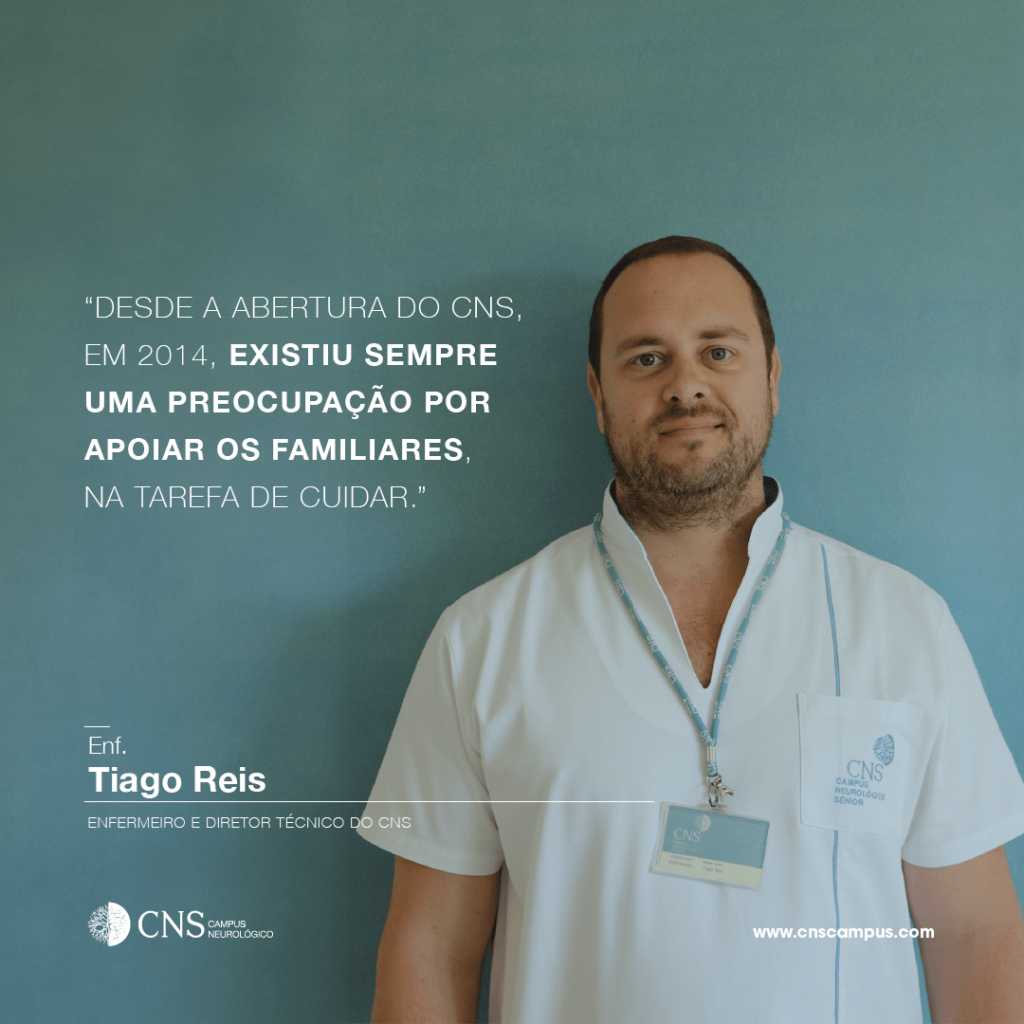Taking care of a family member with a neurological disease is a challenging task. We share an interview with Nurse Tiago Reis, Technical Director of CNS and responsible for Caregiver Courses, in which he tells us how these courses came about, their value, and the reaction of the participants.
Currently, CNS offers courses for caregivers of people with Parkinson’s disease and courses for caregivers of people with Alzheimer’s disease or other types of dementia. How did the idea of creating caregiver courses come about?
Nurse Tiago Reis (TR) – Neurodegenerative diseases, such as Parkinson’s disease and Alzheimer’s disease, are complex conditions that require continuous and close collaboration, not only from a multidisciplinary team of healthcare professionals but also from family members. At CNS, we see caregiver training as a means to promote the involvement of family members as an integral part of the clinical decision-making process and the optimization of care at home. We often feel the presence of doubts and insecurities about certain signs and symptoms of the disease and its progression.
To address these requests for help, we felt it would be important to create a more structured and dynamic training moment. The courses aim to provide a general perspective on the diseases and how we currently treat them, offer strategies to optimize the patient’s quality of life and safety at home, and foster moments of sharing experiences among participants.
Alongside the sessions for caregivers, the course includes rehabilitation sessions for patients. What is the reason for this dynamic and how does it work in practice?
TR – Since the opening of CNS in 2014, there has always been a concern to support family members in the caregiving task. One of the difficulties often mentioned by family members was not having someone to care for the patient during the training time.
To address this challenge, CNS implemented, alongside the caregiver training sessions, group rehabilitation sessions for patients. This not only facilitates the presence of caregivers but also contributes to the well-being of the patients.
Caring for a family member with neurodegenerative diseases is a learning process that requires adaptation and resilience. What has been the feedback from participants?
TR – The feedback has been very positive. People appreciate having access to reliable information and value having a moment to ask questions and share experiences. Another interesting point was the interest in introducing a conference on the status of “Maior Acompanhado” (Legal Guardian) and supports available for informal caregivers, delivered by the lawyer who supports CNS. Being a more legal than clinical topic, family members do not know whom to turn to for help and guidance in these processes.
2024 is just around the corner. What are the main initiatives scheduled for next year?
TR – In 2024, the courses for caregivers of people with Parkinson’s disease and Alzheimer’s disease or other dementia will have two editions each. The first course for caregivers of people with Parkinson’s disease is already on January 6th and 13th. The first edition of the course for caregivers of people with Alzheimer’s disease or other dementia will be in March. At the end of the year, we will have the second edition of both courses.
What message would you like to leave for people who care for family members with neurological diseases?
TR – Caring for a family member with Parkinson’s disease, Alzheimer’s disease, or another dementia is challenging, leading caregivers to sometimes fall ill themselves. Knowing the diseases and learning strategies to optimize care at home not only contributes to the well-being of the patient but also to greater peace of mind and well-being for family members. It is crucial that caregivers do not go through the caregiving task alone and do not neglect their own care. It becomes essential for them to be aware of their own fatigue, not hesitating to seek help, not only from family and friends but also from specialized healthcare professionals who can answer their questions.
